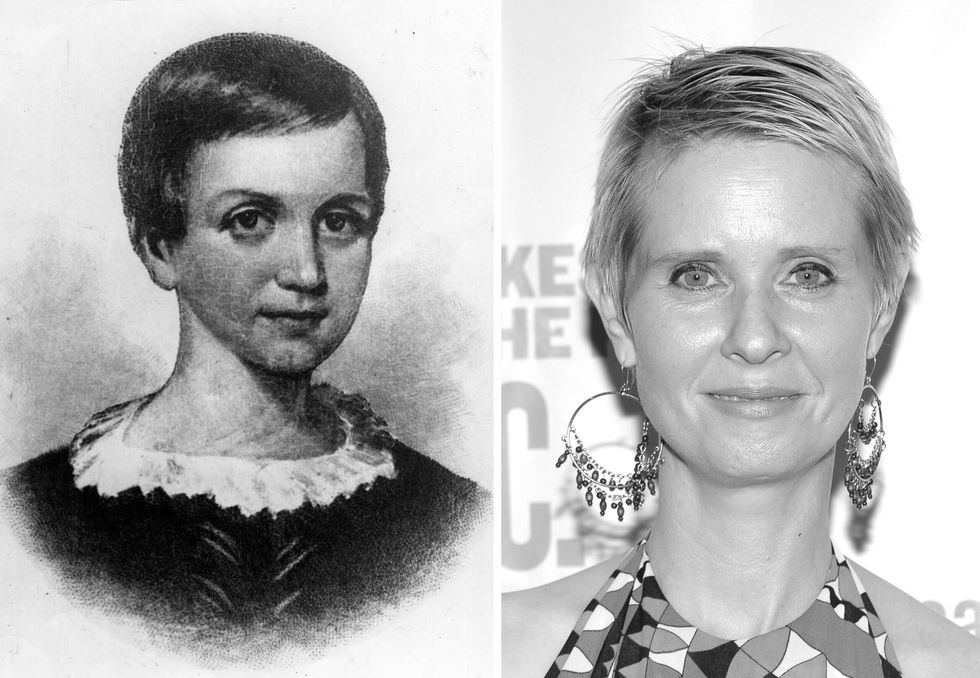Emily Dickinson, often regarded as the "patron saint of the shy," is entrenched in a cultural myth that paints her as a reclusive figure, clad in white, who wrote poetry in seclusion.
However, recent connections between Dickinson and pop sensation Taylor Swift, claiming them to be sixth cousins, three times removed, have stirred renewed interest in the 19th-century poet.
Swift's albums, particularly Evermore, with its release date coinciding with Dickinson's birthday and thematic parallels to Dickinson's works, have fueled speculations about the contemporary relevance of the poet.
"If my lyrics sound like a letter written by Emily Dickinson's great-grandmother while sewing a lace curtain, that's me writing in the quill genre," said Swift while accepting the Songwriter-Artist of the Decade award from the Nashville Songwriters Association International in 2022. That quote draws on associations with the 19th-Century poet that have long lingered since she died in 1886.
The pervasive image of Dickinson as a solitary figure, reluctant to leave her bedroom, has contributed to a cult-like fascination surrounding her. This persona, often dubbed the "patron saint of shy persons," emerged despite Dickinson's actual social engagement and intellectual prowess.
The 2017 film A Quiet Passion and Rosanna Bruno's graphic novel, The Slanted Life of Emily Dickinson, have sought to challenge and diversify this narrow perception.

Dickinson, who wrote nearly 1,800 poems, faced limited publication during her lifetime, with only ten poems printed before she died in 1886. Posthumously, her work gained a devoted fan base, particularly among women readers, leading to pilgrimages to her home, the Homestead, now a museum in Amherst, Massachusetts.
The allure of Dickinson's poetry lies in its exploration of themes such as love, desire, pain, and death, considered unconventional for a 19th-century writer.
The myth of Dickinson as a reclusive spinster, isolated from the world, has been perpetuated for decades. This image, juxtaposed with the reality of Dickinson's social activism, forms a paradox that captivates readers and scholars alike. While Dickinson did retreat from society, especially later in life, it was a deliberate choice that allowed her the freedom to address taboo topics openly.
In a staunchly patriarchal society, Dickinson's seclusion became a space for her to express ideas about love and desire that other writers of her time could not.
The 2018 film Wild Nights with Emily challenges the traditional narrative surrounding Dickinson. It portrays the poet as a passionate rebel, engaged in meaningful relationships and actively involved in the social dynamics of her time. Molly Shannon, known for her lively performances, plays Dickinson in this film, capturing the audacity and subversiveness of the poet's character.
Beyond the cinematic portrayal, Dickinson's own words offer insight into her extraordinary mind. Her poems, only ten published during her lifetime, reveal a profound understanding of the human experience.
A quote from one of her letters encapsulates the impact of her poetry: "If I feel physically as if the top of my head were taken off, I know that is poetry." This visceral connection to her work underscores the depth and audacity with which Dickinson approached her craft.
Despite Dickinson's complexity and the ongoing efforts to dispel myths, her legacy endures. Scholars like Paul Hetherington emphasize her role as the first truly modern poet in the English language, challenging societal norms and conventions.
The reevaluation of Dickinson's life and work extends beyond her poetry to address the marketing and construction of her public image, highlighting the potential disconnect between an artist's persona and the true meaning of their work.
In conclusion, Emily Dickinson's mystique as the "patron saint of the shy" has perpetuated a narrow and often inaccurate view of her life and poetry. Recent connections to contemporary figures like Taylor Swift and creative projects like Wild Nights with Emily and The Slanted Life of Emily Dickinson strive to present a more nuanced and authentic portrayal.
Dickinson's poems, timeless in their audacity and modernity, continue to resonate and inspire, challenging readers to reassess the cultural myths surrounding this iconic poet.



